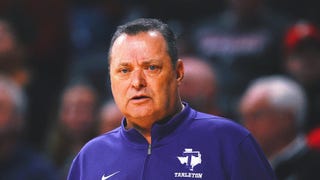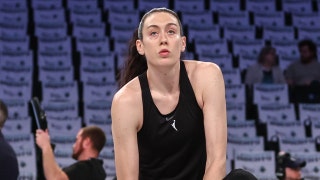The San Jose Sharks are spending four days in Germany, many of them filled with fun activities, before flying to Stockholm to get down to the business of starting the NHL regular season. But Monday, players will give up their free time to take part in something more meaningful than a round of golf or sightseeing.
Sharks players and coaches will visit patients at Landstuhl Regional Medical Center, the largest military hospital outside the United States. The hospital is about 20 minutes from Ramstein Air Base and an hour from Mannheim. It houses military members who have suffered the most catastrophic injuries during the wars in Iraq and Afghanistan, including those who have lost limbs in IED (Improvised Explosive Device) attacks.
Michael Lewis, the director of USO Germany who helped put the visit together, described the type of men and women the Sharks would be visiting after their Monday afternoon practice at SAP Arena in Mannheim.
"The hospital here in Landstuhl, it is the first stop they make when they fly them out of Iraq or Afghanistan or wherever the conflict may be," Lewis said. "This is the closest hospital to the combat area that is outside of the combat hospital on-site. So if a soldier or military member experiences a severe injury -- a gun-shot wound, they lose limbs, they lose their legs, they lose their arms -- they come here. For those that are severely burned by an IED attack, they come here, they stabilize them some more, and then they are med-evaced (flown) to our burn units in the States.
"When you hear about something that happens on CNN where our soldiers are hit by an IED, those that are severely wounded and those that are killed are flown into Landstuhl and Ramstein Air Base where they receive treatment or prepare the body for transport back to the States."
Lewis said the Sharks jumped at the opportunity when the USO presented the idea of coming to the hospital. The USO has hosted many events like this, where celebrities and pro athletes take time to say hello to the men and women who voluntarily defend the United States at home and abroad, but Lewis said it will be the first time an NHL team has visited a military hospital like this one.
While an athlete never truly can understand what a soldier is going through with his or her injuries, Lewis said sometimes the two groups find a connection.
"Our soldiers are the best in the world," Lewis said. "When a military member is injured and they're laying up in a hospital bed, the vast majority of those wounded soldiers, their question to the doctor is, 'How soon can I get back to my unit?' Because they feel like they are not there to support their men and women, the guys they climb in the foxhole with. They feel like they're letting their comrades down.
"It's encouraging when you walk through these rooms and you see these gentlemen and women who are asking their doctor how soon can they get back regardless of what their injury may be -- bullet wounds, burn wounds. We've had members of the military who have lost a limb to an IED attack and their goal was to go back to their area of operations with their prosthetic and they've done that. It allows them to go back and have closure on that event.
"With an athlete, in this case with hockey players, when they get injured during a game, they're doing the same thing. All they want to do is get rehabilitated quickly or treated on the bench so they can get back in the game. They don't want to sit on the bench and not be part of the action that contributes to the win. These soldiers are the same way."
Lewis also said the lift the wounded military men and women receive from visits like this and how it aids in their recovery can't be underestimated. It's also an eye-opener for the sports figures to see a truly severe injury.
"When these celebrities or athletes or VIPs come and visit our soldiers, that's huge for morale," Lewis said. "We've had some big-time athletes go through and visit some of our soldiers in the intensive care unit and they've broken down and gotten teary-eyed because these guys are ready to go back to battle even though they just received bullet wounds, shrapnel, burn injuries, a loss of a leg. But they're still so pumped up and dedicated to our mission that their concern is, 'I want to get back in the thick of the fight.'
"So when you get a visit like this from athletes, that's encouraging for them to see. It's probably just as encouraging for the athletes. Here they are maybe pulling a hamstring and they're out of action, and here you got a soldier who's lost a leg, and his comment is, 'I want to get back with my unit.' Sometimes it puts it into perspective that, 'You know, maybe my pulled muscle is not the worst thing that could ever happen to me.'"
Sharks defenseman Douglas Murray was born in Sweden but came to the United States as a teen to pursue his hockey career. He's looking forward to the visit.
"Obviously if we can lift their spirits, that would be great," Murray said. "I have a respect and an appreciation for them just like an American has. I've lived in this country for 13 years now. They have the toughest job in the world, they do some crazy situations and they take a lot of heat for it a lot of the times, too, from around the world. I can't imagine what they go through on a daily basis. It's definitely going to be a memorable experience."
Follow Dave Lozo on Twitter: @DaveLozo








































